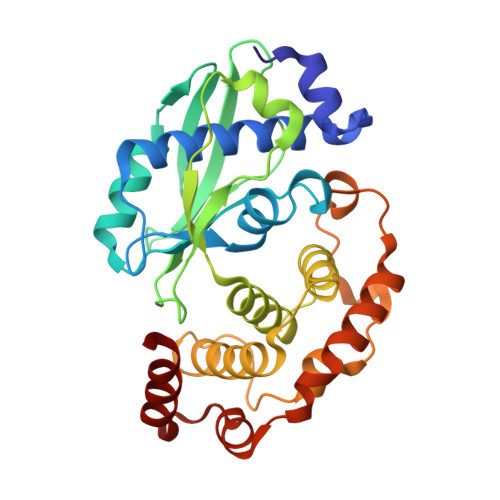A nucleotidyltransferase toxin inhibits growth of Mycobacterium tuberculosis through inactivation of tRNA acceptor stems.
Cai, Y., Usher, B., Gutierrez, C., Tolcan, A., Mansour, M., Fineran, P.C., Condon, C., Neyrolles, O., Genevaux, P., Blower, T.R.(2020) Sci Adv 6: eabb6651-eabb6651
- PubMed: 32923609
- DOI: https://doi.org/10.1126/sciadv.abb6651
- Primary Citation of Related Structures:
6Y56, 6Y5U - PubMed Abstract:
Toxin-antitoxin systems are widespread stress-responsive elements, many of whose functions remain largely unknown. Here, we characterize the four DUF1814-family nucleotidyltransferase-like toxins (MenT 1-4 ) encoded by the human pathogen Mycobacterium tuberculosis . Toxin MenT 3 inhibited growth of M. tuberculosis when not antagonized by its cognate antitoxin, MenA 3 . We solved the structures of toxins MenT 3 and MenT 4 to 1.6 and 1.2 Å resolution, respectively, and identified the biochemical activity and target of MenT 3 . MenT 3 blocked in vitro protein expression and prevented tRNA charging in vivo. MenT 3 added pyrimidines (C or U) to the 3'-CCA acceptor stems of uncharged tRNAs and exhibited strong substrate specificity in vitro, preferentially targeting tRNA Ser from among the 45 M . tuberculosis tRNAs. Our study identifies a previously unknown mechanism that expands the range of enzymatic activities used by bacterial toxins, uncovering a new way to block protein synthesis and potentially treat tuberculosis and other infections.
- Laboratoire de Microbiologie et Génétique Moléculaires, Centre de Biologie Intégrative, Université de Toulouse, CNRS, UPS, 118 route de Narbonne, 31400 Toulouse, France.
Organizational Affiliation:
















